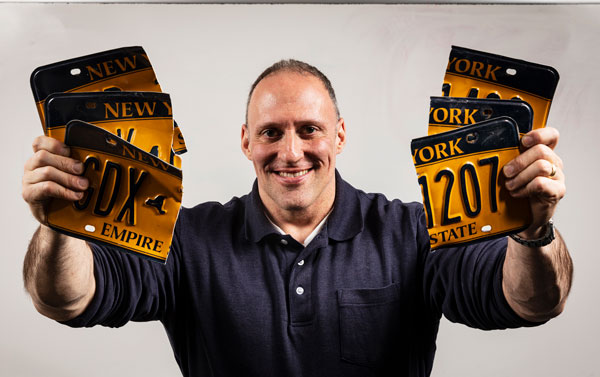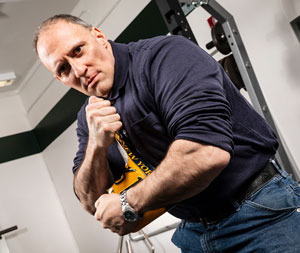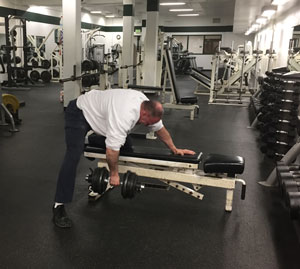Binghamton health and wellness lecturer earns Guinness World Record

Health and Wellness Studies Adjunct Lecturer Bill Clark credits mental strength and determination for his many weightlifting, powerlifting and strongman achievements.
“In life, it’s never about where you start, it’s where you end up,” Clark said. “I’ve failed so many times, that’s how it goes. But it’s that consistency over time to say, ‘Yeah, I failed, but I’m not going anywhere.’”
This mental determination came in handy in August when he attempted and successfully beat the Guinness World Record for most license plates torn in one minute. Clark used the unique achievement to raise awareness for childhood cancer.
“I mean, who really cares if you rip a license plate? It’s kind of humorous,” he said. “It’s entertaining, but I thought I could use it to raise awareness for a disease that is pretty important to me.”
Guinness agreed to promote the cause if Clark could beat the record of tearing 20 license plates consecutively in one minute’s time. He tore 23.
Tearing license plates comes naturally to Clark. A specific technique for ripping the plates, along with months of practice, helped him beat the record. He found that keeping one wrist straight and the other at a slight angle made all the difference.
“There’s a technique to anything,” he said. “There’s a technique to writing well. There’s a technique to having a good interview. There’s a technique to bench pressing 500 pounds. You have to have all of the elements in place to have good things, I think.”
Since owning unregistered license plates is illegal in New York, Clark had to get permission from the Broome County Clerk’s Office and the Department of Motor Vehicles to obtain license plates. The clerk’s office even gave him boxes of plates to practice with.
Clark’s interest in strength sports was sparked back in high school, when he began powerlifting for football. After a trainer noticed him at a gym, he began training to become an Olympic weightlifter and joined the York Barbell Olympic weightlifting team in Pennsylvania six months later. He became an international medalist for Olympic-style weightlifting while still a teenager.
At 19, a coach tested Clark to determine his strengths and weaknesses. He found that the length of Clark’s back was not optimal for Olympic-style weightlifting; however, it was an advantage for powerlifting. This gave Clark the push he needed to return to powerlifting, and he went on to win state, national and world championships in the sport.
Clark is one of only a few athletes to be an international medalist in both Olympic-style weightlifting and powerlifting. He is also a member of the Strength and Power Hall of Fame. He attributes his accomplishments to the coaches he had throughout his career.
“It’s the power of good coaching,” he said. “I wouldn’t be doing the things I do if it weren’t for them. So, I always want to throw out those props.”
After struggling to compete with injuries, Clark moved on from powerlifting in his 30s. A friend convinced him to try strongman demonstrations such as rolling frying pans and tearing novels. It was then he discovered his talent for tearing license plates and decided to beat the Guinness World Record.
Clark started teaching strength-training courses at Binghamton University in the fall 2018 semester. When the University first contacted him, he wasn’t sure he could fit another job into his busy schedule. After meeting with the staff, however, he realized the opportunity was worth it.
“When I got there, everybody I met was just so awesome,” he said. “I came in 50/50 [wanting the job] and walked out thinking, ‘God, I hope they hire me.’”
Clark loves teaching in Health and Wellness Studies (part of the Decker School of Nursing), especially helping students solve problems that are holding them back from maximum success.
“Success is cleverly hidden in the ability to problem solve,” he said. “You can’t get somewhere good without a problem. Watching the light come on and seeing the students’ faces as they overcome a challenge, I love that.”
Most of all, Clark enjoys the students.
“I haven’t had one student here who has not totally soaked up what I give,” he said. “They’re helpful, they’re kind — these are the types of people I want to be around, and that’s why I love it. If the students weren’t awesome, I wouldn’t be here.”



